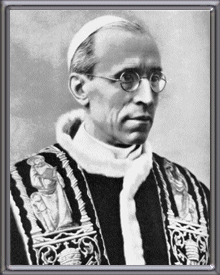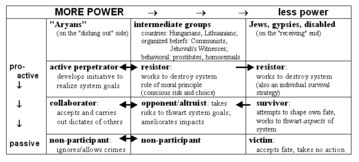Pius's Diplomatic Forms
of Resistance (back to top)
In his few Christmas speeches, the Pope did make several allusions to
the problems in Germany and his disgust with them (Lockwood). He used
a careful and sustained type of criticism that was just enough to let
them know that he was not one of their supporters. Many felt that this
was not enough though. However, he was not able to take any other sort
of action. In his Christmas speech of 1942, the pope may not have singled
out Hitler and mentioned his name clearly, but he openly denounced the
maltreatment "…of hundreds of thousands, who without any fault of
their own, sometimes only by reason of their nationality or race, are
marked down for death or progressive extinction…" (NY Times,
1942). As Hitler was the only person at the time systematically attempting
to exterminate a race of people, the pope was obviously painting a picture
of him. With a statement like this, it is hard to ignore the fact that
the pope is making a clear attempt at condemning the Nazis and Hitler
for their actions in the Holocaust.
His responses may not have been as drastic and dramatic as much of the
Catholic community felt was warranted, but they were cautious steps in
a direction that attempted to handle matters in a diplomatic way. In another
silent yet anti-Nazi act, the pope used Catholic institutions to hide
Jews upon learning that Italy had been taken over, thus making the Vatican
the local authority. After learning that deportations would probably begin
immediately, actions began in saving as many Jews as possible. The Vatican
claims that it hid nearly 500 Jew,s while other institutions held a little
over 4,200. In addition to this, the Vatican also offered to give 15 kilos
of gold to help with the 30 kilos that the Nazis were demanding before
the deportations (Jewishvirtuallibrary.org). These actions may not have
been proclaimed and shouted aloud for the world to hear, but they were
definitely not actions that supported Hitler and the massacring of Jews.
In secrecy, the Pope was able to save thousands. If he would have done
this for the public to be aware of, then he might have contributed to
the deaths of thousands. [hm: why? his audience would
have been arrested for listening, or his listeners would have begun to
openly resist the Nazis?]
In addition to these practical and secretive measures to protect the
Jews from the Holocaust, the pope also was the driving force behind a
sort of "underground railroad" providing secret escape routes.
However, it was other prominent Catholic figures that were operators of
such acts. However, these would never have gone into effect if it were
not for Pius XII (Wikipedia.com). Many of the Catholic leaders that did
take hands on approaches were completely open about their condemnation
of the Holocaust, and it must be remembered that Pius XII hardly ever
stood in their way. He knew that he personally could not take a distinct
and open stance, but he also allowed those under him to openly strike
back against Hitler without interfering.
|

